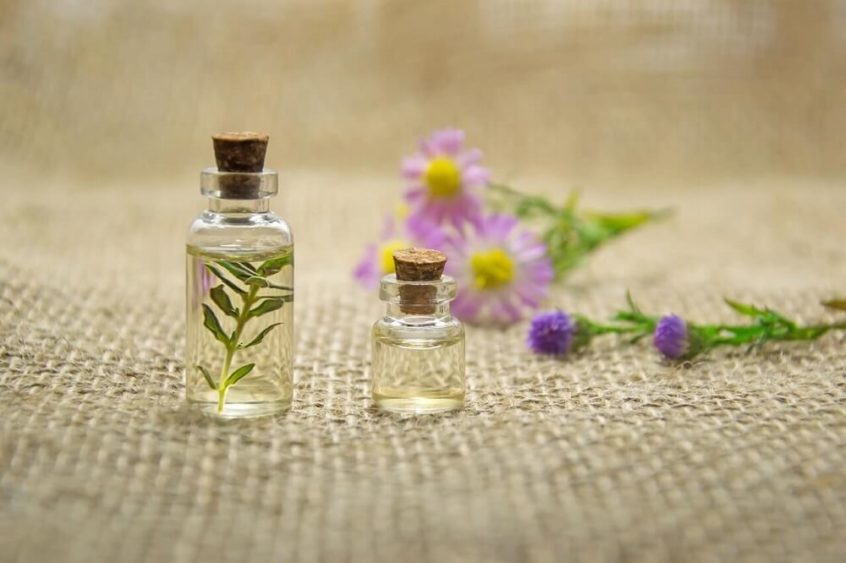
Claire Levenberg is currently the Research & Development Manager for the iLAVA and iLAVAHEMP Brands and the Director of Science Operations for the Downtown and D2 Dispensaries.
She has been in the medical cannabis industry for 3 years now, with in-depth knowledge of Ethanol Extraction, Fractional Distillation, Butane Extraction, lab operations and requirements, and managing daily productions as well as researching new products. Her interests lie in researching new techniques, product development, and educational outreach.
Claire received her Bachelors of Science from the University of Arizona in Plant Sciences with a focus in Microbiology.
Essential oils are concentrated extracts of plants that many people claim to have health benefits. They have been around for over 6000 years and continue to be popular today.
They are used by practitioners in aromatherapy and naturopathy. These are forms of alternative medicine that apply the components of essential oils to treat diseases. However, there is no sufficient evidence that suggests the ability of essential oils to fully cure any disease.
Scientists and medical organizations are still conducting researches to fully prove all of the benefits of the essential oils.
This article explains how essential oils work, their potential benefits, side effects and how to use them for optimal results.
Essential oils are liquid extracts from plants that contain active ingredients that give them a unique scent and flavor.
The essential oils get extracted through different ways including distillation and mechanical methods like cold pressing.
- Distillation – can be done using either water or steam. It involves passing water or steam through the plants so that the active compounds get pulled from the plant matter.
- Cold pressing – a mechanical method of extracting essential oils. You mechanically squeeze out the plant juices from the plant matter. Cold pressing is used to pull essential oils mostly from citrus fruits such as lemon, mandarin oranges, and grapefruits.
Other essential oils like cinnamon get extracted from the bark of trees. Barks contain highly potent chemical compounds.
Essentials oils that are obtained through chemical processes are not considered true essential oils.
How Do Essential Oils Work?
Essential oils are mostly used in aromatherapy.
Aromatherapy is the use of plant extracts to treat different medical conditions or improve the beauty of the skin and the overall well being.
Essential oils can get ingested but only under the guidance of a trained physician.
Moreover, when applied to the skin, the chemicals get absorbed.
Inhalation through the nose or mouth is another way of using essential oils.
Common examples of essential oils inhaled include eucalyptus used for cough and rose for acne and dry skin.
When inhaled, the essential oils are put in diffusers. This way you will feel the effect much faster than topical application.
What Makes Essential Oils Effective?
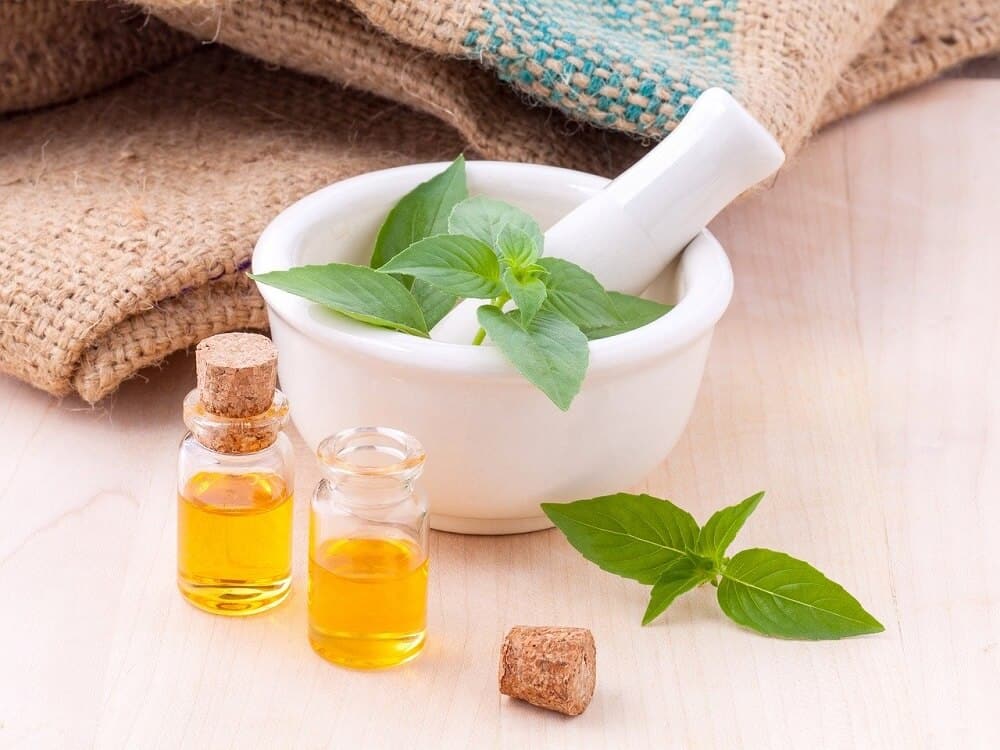
Essential oils have been used for over 6000 years. They were applied in ancient Egypt, China, and India for both medicinal and psychological purposes.
Since then, they have been used for their potential treatment abilities of different diseases across the world.
The active compounds in the essential oils have been suggested to be therapeutic. For example, Lavender is known to have the potential of treating burns.
Research is still being conducted on various essential oils to determine their healing capabilities based on the active ingredients they contain.
What Are Some Popular Essential Oils?
There are over 100 essential oils and each has a unique smell and potential benefit to the body.
Here is a list of 9 most popular essential oils with the benefits claimed to be linked to them:
- Lavender: Used for relaxation and improves mood.
- Blue Tansy: Used to reduce nasal congestion due to its potential antihistamine properties
- Helichrysum: Used to treat acne and prevent inflammation in the skin.
- Calendula: Used to relieve diaper rash and treat skin conditions such as eczema.
- Peppermint: Used to relieve nasal congestion and maintain oral hygiene.
- Frankincense: Used to heal age spots, scars and stretch marks.
- Rosemary: Used to improve brain function and memory. It is suitable when reading or working on a project.
- Arnica: Used to cure pain caused by osteoarthritis, surgery, and sore throat. It is also used to treat swelling and bruises.
- Lemon: Used to reduce stress, alleviate pain, improve mood and aid in digestion.
Which essential oils are the best?
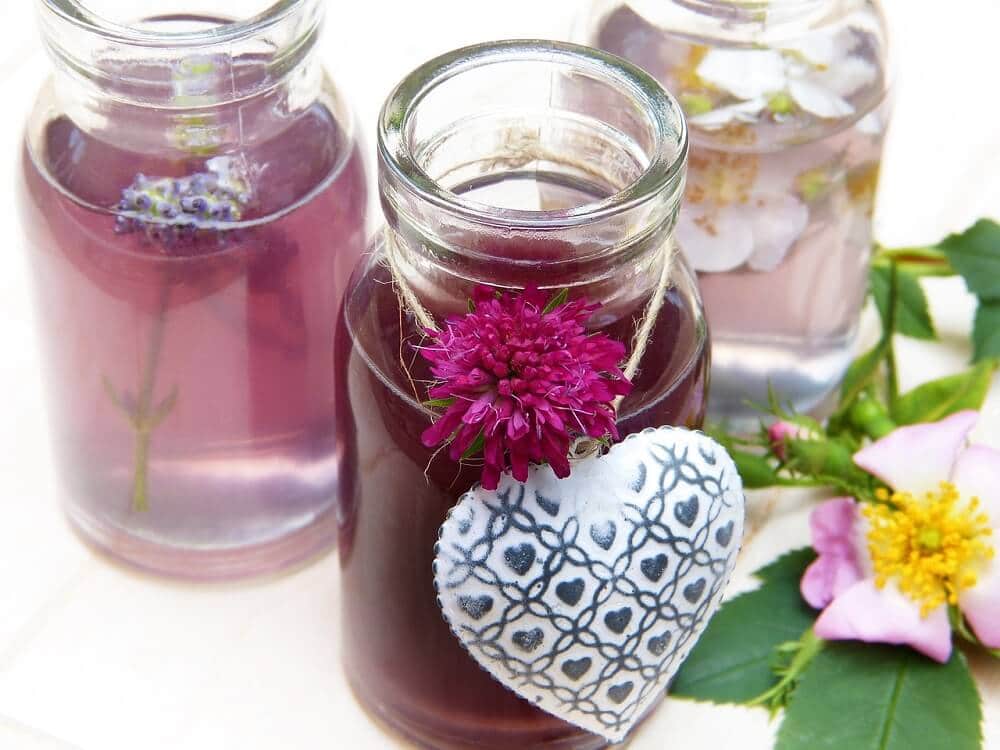
Numerous businesses claim that their essential oil products are safe and of high quality.
Such statements have to be taken with a grain of salt because essential oils are not reviewed by the FDA.
Don’t fall to such pretty words because essential oil products can vary greatly in their chemical compositions.
Here are the 3 most important things to consider when deciding on an essential oil product:
- Reputation: Buy essential oil products from companies that are known to sell high-quality products. Social proof is the best way to know if a product is genuine.
- Quality: Essential oils that have not been mixed with carrier oils have the highest quality. They have not interacted with other chemicals after the extraction process. Choose essential oils extracted through distillation or cold pressing.
- Purity: Look for essential oils that contain only the original active compounds extracted from the plant. Additives and synthetic oils may be added to some essential oils to reduce the side effects or to increase the quantity of the product. Pure products usually have the plant’s botanical name such as Tanacetum Annum for Blue Tansy essential oil.
What is the best essential oil for breathing?
There are many essential oils used to treat breathing problems such as asthma, chest pain, and wheezing.
Even though scientists are yet to prove the abilities of these essential oils, daily users claim that they can help alleviate the symptoms of respiratory diseases.
Some people suggest that Eucalyptus oil has the ability to manage asthma, bronchitis and common cold.
Rosemary relaxes the smooth muscles of the windpipe according to the Indian Journal of Experimental Biology. Participants of the study showed a reduction in the symptoms of asthma such as wheezing, coughing, and sputum production.
People who have used peppermint claim to have been relieved of the symptoms of asthma attacks.
However, it’s yet to be proven if peppermint relaxes bronchial smooth muscles.
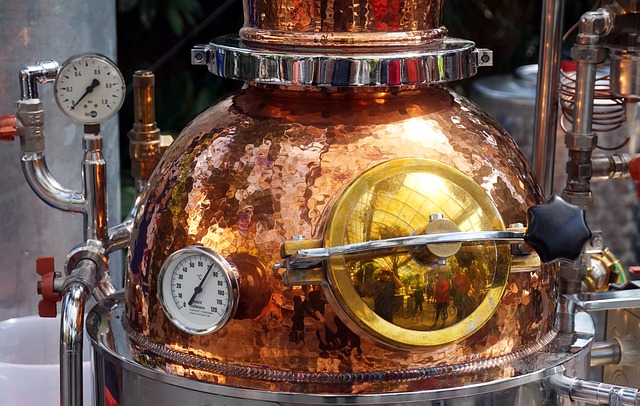
Health benefits of essential oils
Even though essential oils are popular, scientists are yet to come up with tangible evidence that they can cure specific health conditions and replace conventional medicine.
The researches gathered so far, are not enough to put the essential oils in the scientifically proven medicines.
Here are some of the health benefits that people who have used essential oils have claimed to get with studies that supports their benefits to a certain extent.
Sleep and insomnia
The lavender essential oil has a reputation for relaxing the body, relieving stress and improving sleep.
A study published in Research Gate was conducted on the effects of Lavender Aromatherapy on women after childbirth. It revealed that new moms slept better after using lavender oil.
Another study conducted by the University of Southampton on sleep patterns showed the effects of lavender essential oil on insomnia.
Participants of the research noted a 20% increase in quality of sleep when they slept in lavender-scented rooms.Still, don’t forget to consult an aromatherapy specialist before using lavender essential oil as a treatment for sleep and insomnia.
Stress and anxiety
Stressed and anxious people may use essential oils as natural medicine alongside traditional medications.
These studies conducted by the University of Paraiba in Brazil have proven that essential oils have a relieving effect on the symptoms of anxiety and stress.
However, due to the different types of scents from various essential oils, the research has been inconclusive on their effects on anxiety.
Essential oils might also relieve stress when you’re getting massaged. However, the effect only lasts while the massage is taking place. As soon as you get out of the massage session, you stop feeling the relief.
This is according to a study conducted by professionals from Otto Wagner Spital in Vienna.
Seek medical advice from a doctor who specializes in natural medicine before using essential oils as a treatment for stress and anxiety.
Headaches and migraines
Numerous studies have observed the reduction in headaches and migraines when essential oils are pressed onto the forehead.
In the ’90s a study by professionals from Otto Wagner Spital revealed that pressing a mixture of peppermint oil and ethanol on the forehead and temples of the volunteers reduced headache pain.
A recent study also showed that dabbing peppermint and lavender oil to the skin can reduce headache pains.
Even though these studies suggest that essential oils can treat headache pains and migraines, more researches still need to be conducted for an accurate conclusion.
Reducing Inflammation
People have suggested that essential oils have anti-inflammatory properties, yet only a few test-tube researches have been conducted on this topic.
“Essential oils that originate from different plants display antinociceptive and anti-inflammatory properties.” Ze-Jun Wang, Howard University Department of Medicine.
A study conducted by Slovak Academy of Sciences on a mouse revealed that the ingestion of oregano and thyme oils reduced the severity of ulcerative colitis.
Another study conducted by Isafan University of Medical Sciences on two rats using rosemary and caraway respectively also delivered similar results.
Human studies conducted on the anti-inflammatory effects of essential oils are not conclusive. So the safety and effectiveness of essential oils in treating inflammation are not known and still under investigation.
Skin imperfections
People have numerous skin conditions including dryness, sensitivity, acne, skin rash and many more.
Essential oils have been used to treat these skin imperfections for many years.
However, there are few studies that have been conducted on the human skin that prove their benefits.
“Plant oils have the potential of treating skin conditions due to the active compounds they contain.” Tzu-Kai-Lin, Chang Gun University College of Medicine
A 2015 Study by Jeonju University in Korea found that a mixture of lavender and thyme could treat atopic dermatitis in mice. This result made some researchers believe that lavender and thyme could treat eczema in human beings.
There are also other like blue tansy and helichrysum essential oil which are also said to treat certain skin conditions like acne and eczema.
Antibiotic and Antimicrobial
Due to the increase in antibiotic-resistant bacteria, scientists have renewed their research on the best health drugs that kill bacteria.
Even though some people claim that essential oils such as coriander and cumin seed oils have powerful antibacterial effects, studies are yet to be concluded. The results of the test tube studies conducted may not reflect the effects of essential oils in humans.
A recent study concluded that only the coriander/cumin seed oil combination showed synergistic interactions both in antibacterial and antioxidant activities.
Oral Hygiene
There are many DIY kinds of toothpaste and oral health recipes that contain essential oils. But there are insufficient studies that prove the benefits of essential oils in oral hygiene.
“Essential oils are not a replacement for good oral hygiene like brushing, flossing and visiting your dentist for regular check-ups. But, they can be an effective addition to your oral health routine.” Larry Kuhl, DDS, Senior Dental Consultant at Delta Dental of Washington.
Essential oils like peppermint, clove, tea tree and sage are suggested to treat bad breath. C
Chamomile hydrosol has been used in homeopathic teething. Ensure to consult a dentist before using any essential oil product for oral hygiene.
Improve digestion
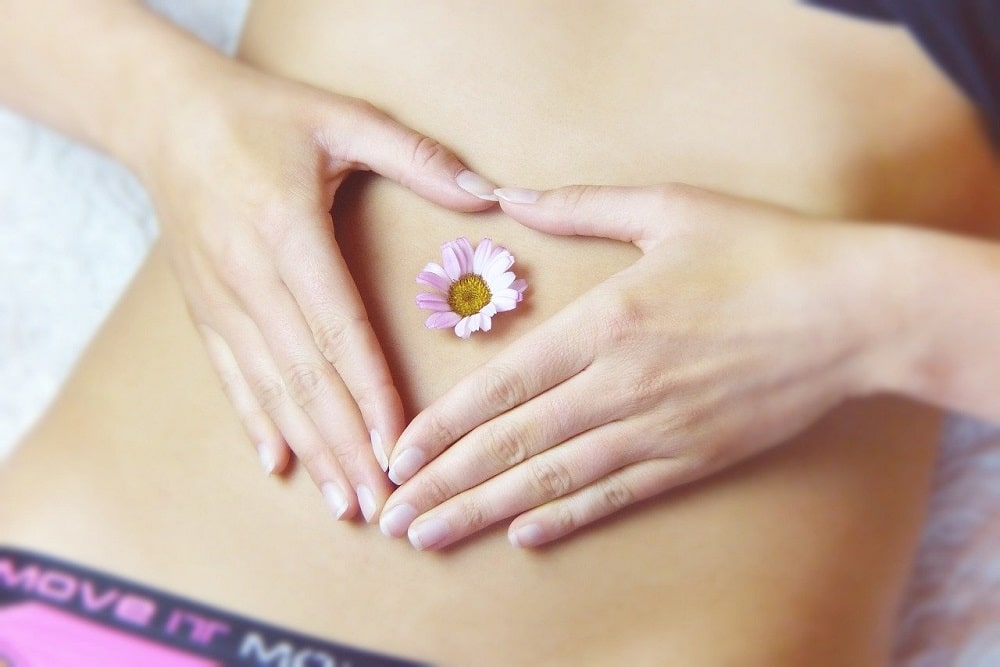
Essential oils have been used to aid in digestion for many centuries.
Despite the popularity of essential oils, some of them are not safe for internal use. Ensure to check the labels for directions of use.
In an Irritable Bowel Syndrome study of peppermint oil, 79% of the participants reported relief from abdominal pain and reduction in flatulence.
There are many other essential oils that people claim to aid in digestion including coriander, ginger, cardamom, and fennel.
The benefits of these essential oils are not conclusive and may vary from one person to another. Scientists are yet to conclude on the essential oils that actually aid in digestion.
What are essential oils good for?
Through the ages, people have claimed that essential oils are good for skin and the body in general. Some are used to aid digestion while others relax the mind and reduce stress levels.
“Essential oils have many properties including antinociceptive, anticonvulsant and anxiolytic-like.” Thomas Heinbockel, Howard University, Department of Medicine.
While essential oils continue to gain popularity, studies are yet to come up with evidence that proves their safety and actual effects on the body.
Some essential oils may exhibit different effects on two people, according to this study conducted by Ze-Jun Wang and Thomas Heinbockel. While it may yield the expected benefits in one patient, it may cause severe side effects in another patient.
If you’re wondering what essential oils are good for your condition, then seek advice from licensed practitioners.
Other uses of essential oil
There are numerous essential oils benefits that people claim to get. Here are other uses for essential oils.
Cleanse and purify the air
Essential oils such as Aloe Vera and Eucalyptus are used to purify the air.
People use them to cleanse their spaces and destroy pollutants lurking in the air.
They contain active compounds that might cleanse and purify the air.
Studies are yet to prove if citrus fruits such as orange and lemon also purify the air.
Create an uplifting atmosphere
Orange and lavender essential oils are often used for raising moods.
Some people claim that essential oils affect our limbic systems. The limbic system is responsible for mood, memory, and other vital functions.
Side effects
Even though companies will claim that their essential oil products have no harm and treat many conditions, essential oils do have side effects.
Plants have active compounds that may be dangerous to your body if not taken with caution.
That is why some essential oils get diluted in a carrier oil.
Doing this reduces the intensity of the reactions of the body such as irritation when applied directly to the skin.
Some of the common side effects include:
- Headache
- Asthma attacks
- Allergic reactions
- Irritation and burning
Seek medical help whenever you experience any allergic reaction after using essential oils. Getting medical advice from aromatherapy and medical experts is the best way to avoid the side effects of essential oils.
"Through various safety tests on essential oils we learn that there are very few side effects or risks when essential oils are used as directed."
PDQ Integrative, Alternative, and Complementary Therapies Editorial Board Tweet
Risks and Safety
Are essential oils safe? When used as directed, essential oil products are less likely to cause risks to your health. If these natural chemicals are properly extracted, they can be used to help you physically.
"Aromatherapy has the potential to cause adverse effects some of which are serious. Their frequency remains unknown."
Dr. Posadski P., University of York Tweet
Essential oils are supposed to be consumed with care because it can affect pregnant women and children.
Accidentally ingesting some essential oils can also be dangerous, because the oils act as toxins while inside the body.
Keep essential oils away from children to avoid such a problem.
Seeking medical advice from doctors before using a product may help to reduce the risks of side effects.
Is inhaling essential oils safe?
Inhaling the scent of the essential oils is the safest way to use them.
You are potentially exposed to fewer side effects compared to other methods of consumption.
One can diffuse the smell of the oil into the air using a diffuser. The fragrance of the essential oils may be beneficial to the body.
Essential oils such as rose can be consumed in different ways. You can inhale it or apply it directly to the skin.
Some people claim that rose is more effective when inhaled than when applied to the skin but there are no direct evidence to this statement.
Can you use essential oils in pregnancy?

There is not enough research showing the effect of essential oils on the fetus, but it is discouraged to use essential oil while pregnant.
However, pregnant women who have used aromatherapy have reported improvement from backaches, anxiety, swollen ankles, and swollen ankles.
“Aromatherapy inhalation during pregnancy reduces anxiety by affecting the parasympathetic nerve activity.” Toshiko Igarashi, Ph.D. Department of Midwifery and Nursing, Nara Medical University.
According to this study conducted by Toshiko Igarashi, Ph.D. on the effect of aromatherapy on pregnant women, anxiety can be reduced through inhalation of essential oils. The active com
pounds in the essential oils may be responsible for these benefits.
The scientists concluded that further research is necessary to get accurate reports on the effects of essential oils on anxiety in pregnant women. Thus, it is absolutely necessary to consult with a medical expert before applying them.
Why are essential oils bad for pregnancy?
Not all essential oils are bad for your pregnancy. There are some essential oils that you can use during pregnancy to alleviate backaches and other pains.
Essential oils should not get used during the first trimester of your pregnancy because they can induce uterine contractions. They can also significantly affect the development of your baby.
“In the second and third trimesters, some essential oils are safe to use, as your baby is more developed.” – Jill Edwards, N.D, a doctor who specializes in Naturopathic Medicine for prenatal care told Parents.
However, in the second and third trimester, Jill Edwards explains that it is safe to use certain types of essential oils.
These essential oils include ginger, lavender, tea tree oil, and lemon.
She also explains that there are certain essential oils that you should avoid completely when pregnant including cinnamon, clove, and rosemary. Some people suggest that these oils may cause premature uterine contractions.
Is diffusing essential oils bad for your lungs?
If you don’t experience any problem when inhaling the scent of the essential oils, then you don’t have to get worried about its effects on your lungs.
If the scent helps you relax, then you don’t need to stop using it.
Only people who have prior lung issues such as asthma may need to consult their doctors before inhaling essential oils.
“There is no piece of sufficient evidence to show the benefit of essential oils towards lung health” says Russell Buhr, MD, A Clinical Professor at University Of California in LA.
How to choose the right essential oil for you?
Choosing the right essential oil is not an easy task because they are not regulated by the FDA.
Companies may claim that their products are medical-grade and safe.
But the only way to be sure that the oils are safe is by considering the reputation of the company among its clients. Also, you can check if there are any negative reviews from customers who experienced any unexpected side effects.
What carrier oil should I use?
Carrier oils are used to dilute essential oils. They reduce the side effects of essential oils such as irritation and other adverse reactions.
Essential oils are also volatile. They may evaporate quickly from the skin surface without causing the expected effect.
Carrier oils don’t evaporate quickly and also don’t have the strong smell exhibited by essential oils. These properties make carrier oils the perfect companion for essential oils.
Some of the popular carrier oils used include:
- avocado oil
- moringa oil
- olive oil
- coconut oil
These carrier oils have extra benefits to the body apart from being the perfect companion to essential oils. Learn the medically safe carrier oils from your dermatologist.
Carrier oils have active compounds that reduce the intensity of the side effects of many essential oils.
They are a natural way of enhancing the benefits of essential oils when applied directly to the skin.
How to find quality essential oils?
The best way to find a quality essential oil is to look for reviews about the product. Social proof is the best way to know if a product is safe or not.
Essential oil products may be popular but they are not regulated by the FDA. This allows manufacturers to make numerous claims about the healing capabilities of their products without having proof.
Before buying an essential oil product ensure to check the reputation of the manufacturer. Companies making high-quality products have a good reputation from their clients.
How can you be sure that your essential oils are pure?
Ascertaining that you’re using pure essential oils should not be a hard task.
Here are some important considerations you should check when purchasing an essential oil product:
- Is the scientific name of the plant provided? – Confirming this ensures that you’re getting a pure essential oil. For example, lavender oils come from multiple species.
- Is the name of the country where the plants were grown indicated? – Quality of essential oils may vary from country to country and showing the country of origin means that the company is honest in its dealings.
- Is there a statement about purity? – It is your right to be informed about the purity of the product. You should know whether it’s 100% pure or mixed with a carrier oil.
- Is its price comparable to other essential oil products in the market? – If it’s cheaper, then chances are that it’s of a low quality.
This report by the University Of Minnesota explains more on how to determine the quality of essential oils.
You should check for the rights reserved mark on the labels of the product.
Bear in mind that genuine companies have copyright for their products.
iLAVAHEMP CBD dailiy intensive cream is a unique blend of organic hemp and 11 certified essential oils, some of them being blue tansy and mango ginger. It is a fast-absorbing topical gel that moisturizes the body and can lead to

Different ways to use essential oils
Some of the ways to use essential oils include:
- inhalation
- oral ingestion
- suppositories
- application on the skin
Internal use of essential oils including oral ingestion and suppositories should be done only under the guidance of a licensed professional. This is because there are many side effects that may occur from using essential oils.
How do I choose a method to apply essential oils?
Consider the desired effect and type of oil you intend to use. An essential oil can irritate the skin because of its chemical composition.
The best way to use these oils will be through inhalation.
You could also dilute them with a carrier oil to reduce their concentration.
Here are some helpful tips:
- Topical applications are most suitable for wound care.
- For mood effects, inhalations will achieve the desired results faster.
How can I inhale essential oils?
There are four ways in which you can inhale essential oils.
Diffuser
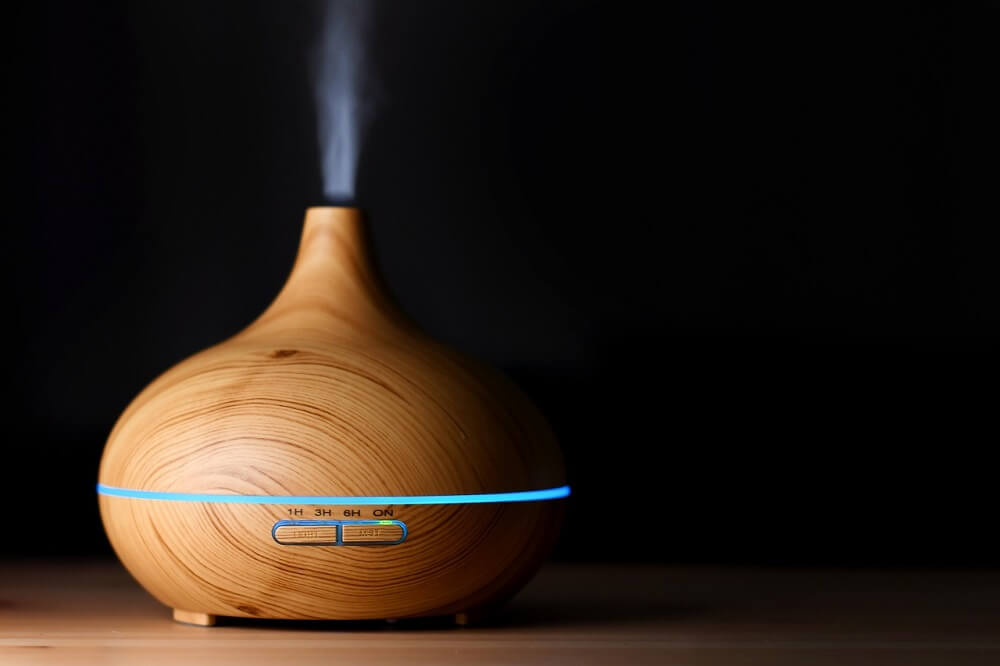
Essential oils get placed inside a diffuser together with water. They then get heated to release the scent into the room.
Lavender is the most common essential oil used with a diffuser. Essential oils should never get burned directly because their chemical structure can change drastically.
Dry evaporation
Add small amounts of essential oil to cotton balls or tissue papers.
The essential oil molecules will evaporate and fill the room.
You can sniff the cotton balls if you want an intense effect.
Steam
This method works even with eucalyptus leaves. However, you would still get good results with eucalyptus essential oil.
Add small amounts of the essential oil into a bowl of steaming water.
Cover your head with a towel so that you breathe the vapor.
Your eyes should be closed when doing this procedure.
Use swimming goggles to see if you don’t want to close your eyes.
Spray
Add small amounts of essential oil to a water-based solution in a spray can, then the resulting solution is sprayed into the air. It sets the mood and purifies the air.
How long should I inhale essential oils?
You should not inhale essential oils for long periods.
The health benefits of essential oils decrease after the first hour of exposure. It follows the law of diminishing returns.
A study by the European Society Of Cardiology was conducted on effects on staying in a room diffused with essential oils for a long time.
The participants were 100 spa workers from Taiwan. It revealed that the health benefits reduce after an hour and prolonged exposure caused vascular and respiratory stresses.
Robert Tisserand who is a world-leading aromatherapist suggests that you should inhale essential oils through intermittent diffusion.
He proposes 30 to 60 minutes of inhalation followed by 30-60 minutes when the diffuser is turned off.
How do I apply essential oils topically?
Pure essential oils can be applied to the skin using various methods. Note that essential oils should not be used directly on the skin until it is diluted with a carrier oil. Some of the techniques you can use include:
Compressing
The essential oil gets diluted in the carrier oil. Then it is applied directly onto the area of interest or using a dressing.
Gargling
Put small amounts of the oil into the water. Mix the solution and then gargle it for a few seconds, then spit it out. Don’t swallow the solution because the side effects of the essential oil could be severe.
Massage
Add small amounts of the essential oil to a carrier oil and then press it on specific skin regions. The active compounds in the essential oils will be absorbed to bring therapeutic effects.
Baths
This method requires a dispersant because essential oils are insoluble in water. Dispersants such as full cream milk can spread the essential oil ensuring that you get maximum benefit through absorption by your skin.
How do I store essential oils?
The best place to store essential oils is in a cool and dry place. Here are some tips on how to store essential oils:
- Essential oils should be stored in the refrigerator. Keeping oils in the refrigerator reduces the chances of air exposure and maintains the cool temperature suitable for oils.
- Avoid heat sources. Most oils are inflammable. They are made with alcohol and can catch fire when placed next to stoves, and candles. Keep essential oils away from heat sources.
- Avoid exposure to sunlight. Don’t store your essential oil products in places that get exposed to direct sunlight such as bathroom windows and shelves. Sunlight causes oils to oxidize in a few days or weeks.
- Keep the cap tightly closed on the bottle. Not closing the bottle tightly exposes the oil to air. This allows for evaporation and reduction in the quality of fragrance.
To solve this nightmare of finding storage for your essential oils, you can buy an aromatherapy storage box. This box is built to store all of your essential oils safely. It also provides insulation from heat and direct sunlight.
Conclusion
Essential oils have been used for over 6000 years including ancient cultures such as Egypt, India, and China. They are still popular today because of the potential health benefits people claim they contain.
Studies that support these claims are few or inconclusive. And most of the time, the effectiveness of essential oil products are usually exaggerated.
Plus they might lead to some unexpected side effects on certain individuals so don’t go blindly into using them.
Consulting an expert is always the most reasonable decision you can make.
If you have minor problems, then using essential oils as a complementary medicine may be safe. However, if you have a serious condition, then seeking medical attention from a licensed doctor is the best option.
- Safety guidelines for diffusion. Tisserand Institute
- The effect of essential oil on heart rate and blood pressure among solus por aqua workers. Chuang KJ, Chen HW, Liu IJ, Chuang HC, Lin LY. Eur J Prev Cardiol. 2014 Jul;21(7):823-8. Epub 2012 Nov 29.
- Essential Oils: New Perspectives in Human Health and Wellness. Fabio Firenzuoli , Vikas Jaitak, Gyorgyi Horvath, Imaël Henri Nestor Bassolé, William N. Setzer, and Luigi Gori.Evid Based Complement Alternat Med. 2014; 2014: 467363. Published online 2014 Jun 22. doi: 10.1155/2014/467363
- How Do I Determine the Quality of Essential Oils? Linda Halcón, PhD, MPH, RN, RATC. University of Minnesota
- Essential Oils During Pregnancy: What’s Safe and What to Avoid. Parents
- Physical and Psychologic Effects of Aromatherapy Inhalation on Pregnant Women: A Randomized Controlled Trial. Toshiko Igarashi, PhD. J Altern Complement Med. 2013 Oct; 19(10): 805–810. doi: 10.1089/acm.2012.0103
- Essential Oils and Their Constituents Targeting the GABAergic System and Sodium Channels as Treatment of Neurological Diseases. Ze-Jun Wang and Thomas Heinbockel.
- Enteric-coated peppermint-oil capsules in the treatment of irritable bowel syndrome: a prospective, randomized trial. Liu JH, Chen GH, Yeh HZ, Huang CK, Poon SK. J Gastroenterol. 1997 Dec;32(6):765-8.
- Evaluation of Synergistic Antibacterial and Antioxidant Efficacy of Essential Oils of Spices and Herbs in Combination. Bag A, Chattopadhyay RR. PLoS One. 2015 Jul 1;10(7):e0131321
- [Effects of Blending Oil of Lavender and Thyme on Oxidative Stress, Immunity, and Skin Condition in Atopic Dermatitis Induced Mice]. Seo YM, Jeong SH. J Korean Acad Nurs. 2015 Jun;45(3):367-77
- Effects of extract and essential oil of Rosmarinus officinalis L. on TNBS-induced colitis in rats. M. Minaiyan, A. R. Ghannadi, M. Afsharipour, and P. Mahzouni.Res Pharm Sci. 2011 Jan-Jun; 6(1): 13–21.
- Effects of Carum carvi L. (Caraway) extract and essential oil on TNBS-induced colitis in rats. Keshavarz A, Minaiyan M, Ghannadi A, Mahzouni P. Res Pharm Sci. 2013 Jan;8(1):1-8.
- Effects of a Combination of Thyme and Oregano Essential Oils on TNBS-Induced Colitis in Mice. Alexandra Bukovská, Štefan Čikoš, Štefan Juhás, Gabriela Il’ková, Pavol Rehák, and Juraj Koppel. Institute of Animal Physiology, Slovak Academy of Sciences, Šoltésovej 4-6, Košice 04001, Slovakia. Mediators Inflamm. 2007; 2007: 23296. Published online 2007 Oct 10. doi: 10.1155/2007/23296
- Effectiveness of Oleum menthae piperitae and paracetamol in therapy of headache of the tension type. Göbel H, Fresenius J, Heinze A, Dworschak M, Soyka D. Nervenarzt. 1996 Aug;67(8):672-81.
- Health Promotion through Prevention of Stress and Burnout with Essential Oils for All Professionals at the Otto Wagner Spital in Vienna. Steflitsch W, Steiner D, Peinhaupt W, Riedler B, Smuc M, Diewald G. Forsch Komplementmed. 2015;22(3):185-94.
- A Systematic Review of the Anxiolytic-Like Effects of Essential Oils in Animal Models. de Sousa DP, de Almeida Soares Hocayen P, Andrade LN, Andreatini R. Molecules. 2015 Oct 14;20(10):18620-60
- A single-blinded, randomized pilot study evaluating the aroma of Lavandula augustifolia as a treatment for mild insomnia. Lewith GT, Godfrey AD, Prescott P. J Altern Complement Med. 2005 Aug;11(4):631-7.
- Effect of lavender scent inhalation on prevention of stress, anxiety and depression in the postpartum period. Iranian journal of nursing and midwifery research 21(2):197 · March 2016
- Pharmacology of rosemary (Rosmarinus officinalis Linn.) and its therapeutic potentials. Indian journal of experimental biology 37(2):124-30 · March 1999.
- Essential oils, their therapeutic properties, and implication in dentistry: A review. Namrata Dagli, Rushabh Dagli, Rasha Said Mahmoud, and Kusai Baroudi. J Int Soc Prev Community Dent. 2015 Sep-Oct; 5(5): 335–340. doi: 10.4103/2231-0762.165933
- Wound healing potential of lavender oil by acceleration of granulation and wound contraction through induction of TGF-β in a rat model. Hiroko-Miyuki Mori, Hiroshi Kawanami, Hirohisa Kawahata, and Motokuni Aoki. BMC Complement Altern Med. 2016; 16: 144.Published online 2016 May 26. doi: 10.1186/s12906-016-1128-7
- How Do Essential Oils Work. Linda Halcón, PhD, MPH, RN, RATC. Kate Maher, RN, BSN. University of Minnesota

